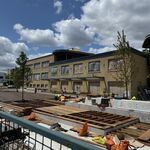gristle
Senior Member
You're right Admiral Beez, the threats of imminent danger and ensuing chaos have been greatly over-stated. Hurricane activity is a perfect example of this. Predictions of larger and more numerous hurricanes resulting from human emissions of carbon dioxide is not supported by the evidence. Some hurricane experts have suggested that warming air and oceans could actually reduce the severity of these storms by reducing the temperature gradient, and that a cooling atmosphere might even increase the severity of these storms. It just goes to indicate that the science is not as settled as so often stated, and that more research is likely required.
Regarding the Arctic, the tree line has not changed appreciably in centuries. Warmer temperatures should be resulting in northward movement. Add to this the extra carbon dioxide - which is absolutely necessary to plant life. Yet the forests are not pushing north.
The last time the tree line actually moved north was during the Medieval warm period about a thousand years ago. It then receded during the Little Ice Age (which is often regarded to have "ended" around 1850).
Is global warming a fraud? I doubt it - given that there appears to be some warming over a number of decades. Is it caused by human beings exclusively? Again, this has not been proven either. Satellite data does not show a consistent upward warming trend over time that matches carbon dioxide emissions. However, people can certainly alter local climate by way of how land is used for human activity. Will such alleged warming cause havoc globally? No, but some locations will probably experience some sort of negative effect if warming continues. Other locations will have positive outcomes.
It strikes me that there is still much to learn.
Regarding the Arctic, the tree line has not changed appreciably in centuries. Warmer temperatures should be resulting in northward movement. Add to this the extra carbon dioxide - which is absolutely necessary to plant life. Yet the forests are not pushing north.
The last time the tree line actually moved north was during the Medieval warm period about a thousand years ago. It then receded during the Little Ice Age (which is often regarded to have "ended" around 1850).
Is global warming a fraud? I doubt it - given that there appears to be some warming over a number of decades. Is it caused by human beings exclusively? Again, this has not been proven either. Satellite data does not show a consistent upward warming trend over time that matches carbon dioxide emissions. However, people can certainly alter local climate by way of how land is used for human activity. Will such alleged warming cause havoc globally? No, but some locations will probably experience some sort of negative effect if warming continues. Other locations will have positive outcomes.
It strikes me that there is still much to learn.




